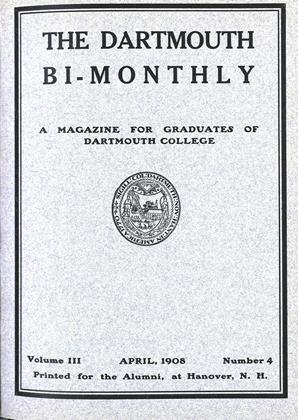Dr. Booker T. Washington,"leader of a race out of childhood into manhood," whom Dartmouth honored with an LL.D. at the Webster Centennial in 1901, honored Dartmouth Friday evening, February 17, with his presence and his eloquent words.
Doctor Washington spoke in Webster Hall, under the auspices- of the Christian Association, and for nearly two hours held a crowded house at an enthusiastic pitch. He told the story of his early struggles in obtaining an education, and in founding the Tuskegee Institute in 1881. This institute, of which he is still president, has grown from a "modest school in a hencoop" to a commanding institution possessing ninety-six buildings, 1400 students, and 156 instructors. In the student enrollment, thirty-seven states and seven foreign countries are represented.
"The students of Tuskegee are taught the dignity of labor," said Doctor Washington. "There is a vast difference between being worked and working. Everybody who has to work is a slave; everybody who works because he wants to is a free man. The negro's prejudice to agricultural training has passed. The greatest work that has yet been accomplished at Hampton and Tuskegee is that of teaching the negro race that all labor is beautiful, digni. fied, and attractive."
Alluding to the "negro problem," Doctor Washington affirmed that there is only one possible solution—"there must be generosity enough, kindness enough, love enough, and Christianity enough, to allow the white race and the black race to live and work out the problem side by side. The hardest man to help is the man that is down when he thinks he is up. The negro is down, and he knows it, he is in darkness, and he longs to find the light. The fact that fifty-seven per cent of all negroes in America can both read and write, proves conclusively that the race has in store a perfect day."
 View Full Issue
View Full Issue













